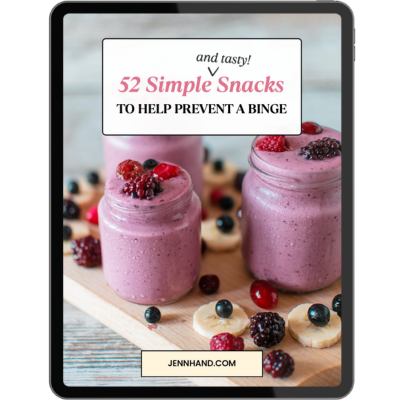
Oh, the countless times I’ve come to meals anxious, upset, and overwhelmed. It didn’t have to be a holiday or a special occasion; even the most basic meal used to give me anxiety. I would be completely and totally in my head, attempting to follow all the “food rules” I had established for myself. My mind would say “since I ate a big lunch, I shouldn’t eat a lot for dinner.” My body would counteract and retort, “But I AM hungry and I want to eat!” And thus ensued the battle between my mind and body. Guilt, frustration, and anxiety would overwhelm me. There were so many voices in my head, all shouting at once, that I would eat so fast, in an attempt to escape my thoughts. How would I ever eat slowly? Was it possible to enjoy the food, company, and conversation? I ate so fast, then judged and reprimanded myself. I would then find myself wanting to consume more to cover all of this confusion and mind chatter. Wanting to eat more cookies, cakes, anything to make the judgment and guilt go away. So many times I thought…can I pause and be with all of this? Can I sit back and be with myself, at the table where there are other people? How do I survive each meal, and enjoy my food when there is so much inner turmoil every time I eat? How do I have compassion for myself? Yes, it is possible to begin to relax into the process of eating without the turmoil and angst. Here are three steps to help you:
Tune Into Your Body: Are you feeling stressed, anxious, and uptight? Is the environment you’re in causing you to feel frazzled and tense? Are you even hungry? So many times, we just dive right into our meals, with a frenzy of thoughts ping-ponging through our minds, and we have no idea if we are hungry, if we become full, or if we are eating what our body actually wants and needs. Giving yourself a minute to tune into your body allows you to pause and check in with yourself, to take a moment to discern what your body is actually telling you. When we are so caught up in the thoughts and voices of our minds, all shouting and vying for our attention at once, we eat so fast, using food to try to tune out those voices. We eat to cover up all of the mind confusion and chatter. But, taking a breath to bring yourself out of your mind and see what you are really feeling allows us to actually pay attention to how we are feeling in the moment.
Acknowledge The Situation: Often times, we come to meals with so much baggage. We are stressed out from a long day, excessively planning our to-do list for later or tomorrow. Or we are caught up in our minds, thinking of all of our food rules that we must adhere to. If we acknowledge the situation-just consciously taking a moment to say “Ok, I am feeling really overwhelmed right now with this meal and wanting to eat healthy” then we are better able to sit with that feeling and let it pass before we indulge in the meal. Close your eyes if you have to. Take a deep breath and acknowledge that there may be inner turmoil around mealtime. Just this simple admission to yourself; simply sitting in this honesty gives you space-space in your mind and body to begin to dismantle and disengage the clamor of voices in your head.
Eat Mindfully: You may hear this phrase thrown out all over the media. Just “eat mindfully” and you will eat less and be more satisfied. But what does this even mean? It sounds so simple. Often, though, the simplest things are actually the hardest to incorporate into our lives… Eating mindfully means pausing throughout the meal. Taking breaths to check in with your body. Asking your body what it needs to be nourished and satiated. While you eat, every third forkful, take a break. It may feel awkward at first, but have a sip of water or cut up the food into smaller pieces to make it feel more natural. Chew your food more than you normally would. If you tend to scarf down your food so fast you don’t even taste it, gently remind yourself to chew each bit 5-10 times before you swallow. Tune in to how the different foods taste and feel in your body. To practice this, you may want to keep a journal the first few times. Or have a snack and practice with something smaller before you delve into a full meal.
Taking small steps to become more aware of how you are feeling before, during, and after meals will begin to relieve your anxiety and overwhelm around food. This week, I challenge you to incorporate these tools into your snack or meal times. Keep a journal and tell me how it’s going!






I love this article! I couldn’t have said it better myself. Why is listening to our bodies not natural for us?? http://www.simplyfitandclean.com